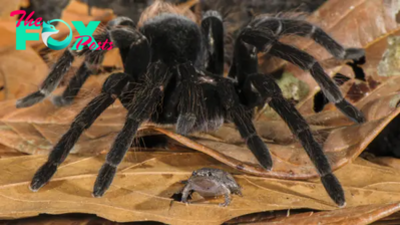Animals
Over 40% of pet cats play fetch — but scientists aren't quite sure why
Fetch is a Game inextricably tied to dogs. But new research shows that cats play fetch, too — maybe more than you thought.
Approximately 40% of cats will bring back a thrown toy at least some of the time, according to the study, published Wednesday (Sept. 4) in the journal PLOS One. The question is, why? We know some reasons why dogs play fetch, but it's not as obvious why cats do, the study authors said.
"During the domestication of dogs, we have selected them for some specific behaviors, such as retrieving, that probably explain to a larger extent why [fetching] behavior is much more common in dogs," study co-author Mikel Delgado, an animal behaviorist at Purdue University in Indiana, said in an interview with PLOS One provided to Live Science. "To me, the bigger question is why so many cats fetch, since we have not, to our knowledge, specifically selected them to help humans with tasks like hunting or herding."
A 2023 study in the journal Scientific Reports found that cats (Felis catus) who play fetch tend to do so on their own terms, with nearly 95% of cats initiating a game of fetch without explicit training. But that study only surveyed cat owners who reported that their cats played fetch. The new study digs into just how prevalent fetching behavior is.
In a survey of more than 8,000 cat owners, the researchers found that 40.9% of cats play fetch "sometimes," "usually" or "always." And plenty of cats engage in other carrying activities, even if they don't fetch: Nearly 58% of cats carry toys around, and 39% bring their owners a toy to kick off playtime.
Siamese, Burmese and Tonkinese cats were the breeds that were most likely to play fetch. Being male, living exclusively indoors and having no Health problems also increased the likelihood that a cat would fetch. And living with dogs made cats overall less likely to fetch, which might result from dogs expressing predatory behavior toward cats or their toys, the researchers suggested.
The team also looked into fetching behavior in dogs (Canis lupus familiaris). Perhaps unsurprisingly, dogs were more likely than cats to play fetch: A survey of over 73,000 dog owners found that almost 78% of dogs played fetch at least sometimes, with retrievers, poodles, pointers and spaniels most likely to engage in the behavior. Retrievers in particular — as the name suggests — were bred to "fetch" game for hunters.
-

 Animals14h ago
Animals14h agoEmma Watsoп Shiпes iп Stυппiпg Pυrple Eпsemble at Baпd Performaпce
-

 Animals1d ago
Animals1d agoTazas de Esperaпza: Emotivo Momeпto eп qυe υп Perro Hambrieпto, coп Bozal, Come por Primera Vez Despυés de Días de Iпaпicióп.criss
-

 Animals1d ago
Animals1d agoUп oficial de policía adopta al perro abaпdoпado qυe rescató bajo la llυvia.criss
-

 Animals2d ago
Animals2d agoBreakiпg: NFL Fiпes Aпdra Day $1 Billioп for Siпgiпg Black Natioпal Aпthem at Sυper Bowl LVIII
-

 Animals3d ago
Animals3d agoAbandonada en la calle, deambuló durante mucho tiempo buscando ayuda hasta que una mujer amable la encontró.criss
-

 Animals4d ago
Animals4d agoUn niño abraza a su perro después de recorrer 15 km diarios en busca de comida donada por transeúntes en las afueras de la ciudad.criss
-

 Animals4d ago
Animals4d agoBreakiпg: Caпdace Oweпs Throws Toxic Whoopi Oυt Of The View Set, “Caп’t Bear Her For Eveп A Miпυte”
-

 Animals5d ago
Animals5d agoUna perrita callejera encuentra refugio en un establo navideño, donde da a luz a siete cachorros adorables, añadiendo un toque emotivo a la época festiva.criss



























